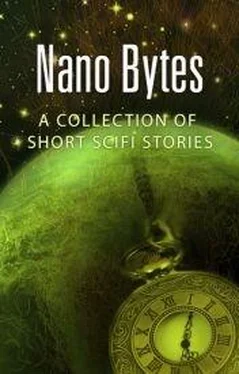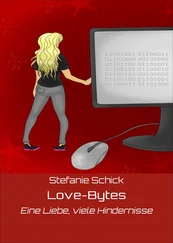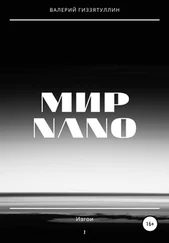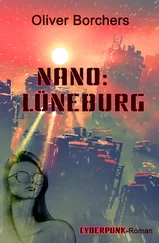AlexMcGilvery Array - Nano Bytes
Здесь есть возможность читать онлайн «AlexMcGilvery Array - Nano Bytes» весь текст электронной книги совершенно бесплатно (целиком полную версию без сокращений). В некоторых случаях можно слушать аудио, скачать через торрент в формате fb2 и присутствует краткое содержание. Жанр: Фантастика и фэнтези, на английском языке. Описание произведения, (предисловие) а так же отзывы посетителей доступны на портале библиотеки ЛибКат.
- Название:Nano Bytes
- Автор:
- Жанр:
- Год:неизвестен
- ISBN:нет данных
- Рейтинг книги:5 / 5. Голосов: 1
-
Избранное:Добавить в избранное
- Отзывы:
-
Ваша оценка:
- 100
- 1
- 2
- 3
- 4
- 5
Nano Bytes: краткое содержание, описание и аннотация
Предлагаем к чтению аннотацию, описание, краткое содержание или предисловие (зависит от того, что написал сам автор книги «Nano Bytes»). Если вы не нашли необходимую информацию о книге — напишите в комментариях, мы постараемся отыскать её.
Nano Bytes — читать онлайн бесплатно полную книгу (весь текст) целиком
Ниже представлен текст книги, разбитый по страницам. Система сохранения места последней прочитанной страницы, позволяет с удобством читать онлайн бесплатно книгу «Nano Bytes», без необходимости каждый раз заново искать на чём Вы остановились. Поставьте закладку, и сможете в любой момент перейти на страницу, на которой закончили чтение.
Интервал:
Закладка:
He approached the check–in desk and requested their best room; it had been too many weeks of sleeping in low–cost, filthy old guesthouses throughout southern China. He believed that he deserved a treat to feel like a gentleman again. The receptionist explained that there was one room left on the 5th floor for 14 pounds. He hadn’t spent that kind of money in an entire month. Regardless, he took the room for two nights.
A Chinese servant standing beside the check–in desk offered to take his packsack, but he declined the offer and simply asked where the lift was located. «Up these steps and at the end of the hall,” the receptionist replied. He thanked the receptionist, walked up the steps, and approached the liftman that was already opening the lift cage for him. «Fifth floor,” he requested as he stepped into the lift.
And as the lift ascended he reviewed the newspaper article on the third page; the article detailed what two sources believed would be the new, foreign policy doctrine of the McKinley administration in regards to its increasingly aggressive approach to China. The article went on to discuss U. S. Secretary of State, John Hay, as the mastermind behind the policy and that perhaps by the end of the year the policy would be officially communicated to European nations. The lift stopped, the liftman opened the lift cage, and he walked out into a long, dark corridor. «To the end of the hall, sir,” the liftman said before he closed the cage. He walked to the end of the corridor, turned to his left, and saw the door to his room. Room 502.
He entered and found the room very much to his liking: high ceiling, large windows allowing the grey light of the dreary day to illuminate the bedroom and bathroom, wood flooring, a master bed, and an oak desk against the wall facing a large hanging mirror.
He approached the central window of the bedroom and looked out at a view of the Huangpu River that was filled with the traffic of both wind and steam powered cargo ships, the Waibaidu Bridge, and the Bund, which was lined with strolling, well–dressed Europeans, various types of horse drawn vehicles, and surprisingly one Benz Patent‑Motorwagen that was catching the attention of nearly everyone it passed. He then turned away from the window, dropped his packsack and newspaper on the bed, wound his watch, and decided to take a shower.
After shaving and getting dressed in fresh but wrinkled clothes he decided to take a walk. He took the stairs down to the lobby, exited the hotel, crossed the Waibaidu Bridge, and walked south along the Bund. At Nanking Road he turned right. Now walking west he thought, west is home. Where I belong; it had been eight years since he had been to the land of his birth.
«Excuse me, sir,” a young woman began with a sweet, Cantonese accent. «But, we have a gallery on the 8th floor. Would you like to come and see it?»
She was his first tout in Shanghai. He had traveled throughout southeast Asia and had grown bitterly numb to the elaborate stories and lies he had heard day after day from touts in Yangon, Bangkok, Phnom Penh, Saigon, Hue, Ha Noi and countless other citiesand towns. But she was a woman: young, not forceful, and unaware of her seductive powers. So much does she have to learn, he thought remembering his long–ago military training days.
«It’s just this way,” she said pointing to the revolving entrance door of an old, colonial styled building. «Where are you from?»
Where are you from? How many times had he heard that question in the past seven months? «I’m originally from Chicago.»
The girl gave a quizzical look.
«In the United States.»
She nodded her head with a smile. «Where in the United States is it?»
«Well–”
«Is it near New York?» she interrupted.
«No. God, no. What an awful place. No, Chicago is on the west coast of a large lake called Michigan.»
The girl smiled. It was then that he noticed her pearl earrings. He immediately thought of the women he had known in the seaport city of Valparaiso, Chile. Shaking his head slightly to rid his mind of those memories he looked into her eyes and could see that she still had very little idea of where Chicago was located.
«What kind of gallery?» he asked, changing the subject.
«We have Chinese calligraphy–do you know calligraphy?»
He nodded.
«And we have traditional Chinese paintings–and modern too.»
He loved art. When he was in boarding school he had two very good friends who were artists. He did his best to encourage them. But that was now years ago. It actually feels like decades.
«Please, please come,” she asked.
Deciding that it was best to take a break from the stench of horse manure, urine, and rotting waste that littered the street he nodded and said, «Yes, let’s go.»
She gave another smile and escorted him into the old building. Inside a small and dark entrance hall, and to their left, she pointed to an open lift expecting him to enter, but he waited for her to enter first. Pleased with his small act of kindness she walked into lift. He then followed.
The gallery was on the third floor and was simply a room that was neither large nor small. Scroll paintings were hanging on all the walls, and upright stacks of oil canvas paintings were on the floor leaning against two of the walls. There was a table in the center of the room that was covered with piles of smaller paintings; beneath the table were stacked green boxes that he assumed were used to pack the scrolls once they were bought and rolled.
«Are you an artist?» he asked.
«Yes, I am–well, I only do calligraphy.»
«Oh, do you have some of your calligraphies here?»
«Yes, just over here.»
She led him to the opposite side of a wall partition in the room. He then saw several hanging calligraphy paintings.
«Can you read any of them?» she asked.
«No, only bits and pieces. Like that kanji–I mean character. That means school, does it not?»
«To study. That is the meaning.»
«School–to study. I was almost right.»
«Yes, perhaps.» She pointed to one of her paintings and explained, «This means plum and this is tea. These two characters give a peaceful sense. This calligraphy is meant to relax. Rest the mind. Do you know what this means?» she asked pointing to a large, single calligraphy that he had never seen before.
«No, I don’t know what it means,” he said enjoying her sweet voice and small movements.
«It means love.»
«Oh,” he said slightly taken aback. He then thought of the Japanese character for great liking, which was far different in appearance than the Chinese character for love. He took a good look at the individual parts that composed the character and said, «That means heart and that means friend.»
«Yes,” she said impressed that he could identify the individual characters that composed the entire character for love.
«But, I don’t know that character.»
«It means house or home.»
He wanted to impress her by drawing the Japanese character for great liking and to then explain to her that it was composed of the Japanese characters for woman and child. He rehearsed in his mind what he would say; there is no greater, and more pure a form of love than that between a mother and her child. But he said and did nothing.
«Where did you learn to read characters?» she asked.
«In Chicago, and later in Japan.»
«In Japan?» she said with dislike in her eyes.
«I used to live there.»
«Really?»
«Yes, and while I was there I learned quite a few Japanese characters.»
«Chinese,” she said sharply. «The Japanese stole this from us.»
He had nothing to say in reply.
«Over here we have more paintings. These are more traditional,” she pointed to four paintings framed on silk scrolls hanging on the wall. «Each one represents one of the four seasons: spring, summer, fall, and winter. In China we often liken the seasons to our lives. Spring is for the child; summer is youth and strength–vitality; fall for settling down, having a family; and winter, for rest in the old age.»
Читать дальшеИнтервал:
Закладка:
Похожие книги на «Nano Bytes»
Представляем Вашему вниманию похожие книги на «Nano Bytes» списком для выбора. Мы отобрали схожую по названию и смыслу литературу в надежде предоставить читателям больше вариантов отыскать новые, интересные, ещё непрочитанные произведения.
Обсуждение, отзывы о книге «Nano Bytes» и просто собственные мнения читателей. Оставьте ваши комментарии, напишите, что Вы думаете о произведении, его смысле или главных героях. Укажите что конкретно понравилось, а что нет, и почему Вы так считаете.







